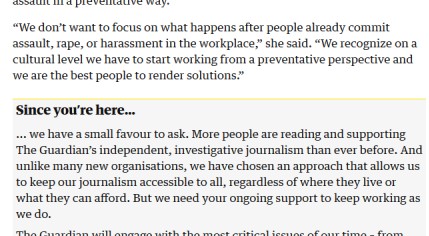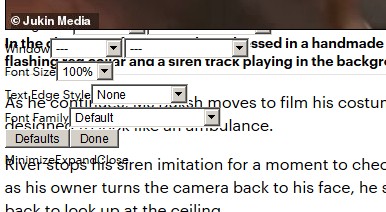 or some inexplicable reason, people don't like animated advertisements
popping up over what they're reading on web pages. They also don't like
being pestered for money. They don't even like being fed a diet of lies,
biased news, phony surveys, and lectures about global warming.
or some inexplicable reason, people don't like animated advertisements
popping up over what they're reading on web pages. They also don't like
being pestered for money. They don't even like being fed a diet of lies,
biased news, phony surveys, and lectures about global warming.
This means that the disconnect between site owners and readers, where one sees their page as the go-to site for hip news while the other sees it as mostly unreadable dreck, with maybe half an article worth reading, is driving websites into the red.
The trend is to put up a paywall. But publishers are fooling themselves if they think people will pay 20 or 30 bucks a month for each of the hundred or so sites they visit. Almost nobody will write a hundred checks a year or pay thousands of dollars to read this stuff.
Readers remember what happened with cable TV, where we were promised ad-free viewing and ended up with 20 or 25 minutes of commercials per hour, with the rest mostly reality shows and reruns. If websites follow the paywall model, how long until they bring back ads, a few at first, then all of them?
But there's a solution: smaller websites could band together into a consortium of like-minded companies. They could create a single point of contact payment system that covers all of them. They can divide up whatever revenue they get however they see fit. They could issue a code that the user can install in their web browser, to make access transparent.

Please stop reading and delete us from your bookmarks (New Scientist paywall)
Since they have no typesetting costs, no paper or distributing costs, and get most of their news from AP, Reuters, or LexisNexis, twenty or thirty bucks a year for, say, a hundred websites, might be a reasonable figure. Those that do independent reporting might get a bigger share. Those that are mostly rehashes of others' opinions and angry rants from people just starting out might get less.
The alternative is ads. But no site that allows ads is really credible: activist boycotts ensure that they tone down their content or get driven off the web by corporations like Google, Paypal and Cloudfare, who use their power to crush dissenting opinion.
The truth is that essentially every article on every website is an ad. Indeed, everything anyone says is, in one sense, an advertisement. Bloggers advertise themselves to build up a reputation. They get practice in writing, and they can get feedback. Others write explicitly to keep their names visible. They make money by including plugs for their latest book.

Website complaining about an ad-blocker (American Greatness)
Since Every Darn Thing These Days™, even in scientific mags like Nature, is stuffed to the gills with politics, a good practice is that all news stories must be signed by the writer, reporter, and fact-checkers, so we know who to laugh at when the story is found to be fake news. There are, however, signs that people are getting sick of politics. If so, many small politically-oriented websites will disappear, and big ones will have to go back to reporting actual events.
Their problem is that everything that happens in D.C. and New York is politics, so they'll have to start reporting on things like the latest theory about neutrino mass or the greatest advance in CAR T cells. Watching them try to explain that'll be a riot. Here's an example of a paper getting the speed of light, one of the simplest concepts in science, hilariously wrong.

The Guardian, an ultra-left-wing paper in the UK, appends a four-paragraph request for donations after each article. This allows sympathetic readers to donate, while still allowing normal people to be exposed to their ideas
But even one animated ad on one single website (and that includes those evil ones that slowly slide down the side of the page when you scroll) means readers will put up ad blockers, and it's easier just to block all ads on every site. If they complain, their bookmark gets deleted. It might not be fair, but if ya got a problem with that, readers will say, take it up with that other site that has all those pop-ups.
There's one site that says “It appears you have an ad-blocker. What are the consequences?” The website republishes press releases given to them by universities and big corporations. Everything they publish is an ad. Send them money? That ain't gonna happen!
I follow the academic model: scientists rarely get paid for writing, but it still helps their careers. I've brought in considerable research funding from by refining my argumentation and writing skills on this site. I also practice creating lectures I can use in class by observing how they're received in the real world. This has gotten me job offers and valuable contacts.
I write articles like this one, then edit them relentlessly, tweaking the prose until it's mostly grammatical and I can actually make sense of what I wrote. Sometimes that never happens, but at least it's good therapy and it keeps me from stealing hubcaps.
The other reason is that, in my profession, if I'm ever caught telling a joke, I'll get fired.
I'm not a cheapskate: I subscribe to several print magazines. But I am also lazy. I can't be bothered to figure out how to access their paywalled content, even though I (presumably) paid for it, so I don't bother.
Why is this important? The median age of a TV viewer is now 56. For classical music radio, it's 65, and many kids have no idea what a “radio” might be. If all websites put up paywalls, the same thing will happen, and only a few big corporate voices will survive. We'll be back in the 1950s, when there were only a handful of TV stations and most people read only a single newspaper, usually a local one because the big city ones were out of date before they arrived.
We'll end up on that site where the news consists entirely of stories about people using the N-word, video clips of Natalie Portman putting groceries in the back of her SUV, close-ups of people puncturing their pus-filled sores, celebrities “showing off their toned pins”, and fluff articles about Meghan Markle. You know the site I'm talking about.

Screenshot of a page at THAT website as rendered in Firefox 69.0.2. It is a story about a dog dressed in an ambulance costume for Halloween and making vaguely ambulance-like howling sounds. The text, however, is unreadable.
Articles like Steve Sailer's witty takedown of Foucault will cease to exist, and the Internet will slide further into a bland monoculture. (Oh, and that reminds me: if the only way for me to donate is through Paypal, it's not going to happen, and my advice is: when they blacklist you, don't expect me to mail you a check.)
In the meantime, I'm going to that site to read those twelve hit pieces on Trump and that story about a turtle drinking raw sewage (metaphor hardly intended at all) and a story about a dog with flashing red lights around its neck and howling like an ambulance. Hell, even National Review can't compete with that.
As for the major newspapers, if they want us to pay to read their stuff they might try telling the truth once in a while.
Update: Another way to make money is a delaying paywall, where paying users can read the articles immediately but non-paying ones must wait a week. This model is used successfully by many scientific journals, who make their articles free to non-subscribers after six months or a year.
sep 25 2019, 7:18 am. last edited oct 31 2019, 6:02 am. updated nov 13 2019
